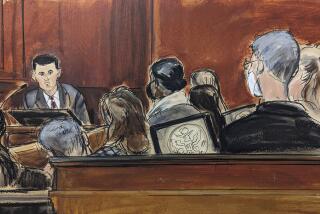Protege Played ‘Limited’ Role, Milken Testifies : Securities: The imprisoned former junk-bond king makes the court appearance in a bid to reduce his sentence.
- Share via
NEW YORK — Michael Milken persisted in his bid for a reduced prison sentence by testifying again Tuesday in the trial of friend and former protege Alan Rosenthal, but he linked the defendant only tenuously to Milken’s own admitted crimes.
In all-day testimony, the imprisoned junk-bond king freely admitted engineering a tax-avoidance scheme that provided Drexel Burnham Lambert client David Solomon with $1.6 million in phony tax losses.
But, as Milken told it, Rosenthal’s role in the plan was limited to identifying “three or four different securities” that could be bought and quickly sold by Solomon to generate a tax loss.
Milken also undercut an embezzlement charge against Rosenthal that arose from Drexel’s dealings with a junk-bond mutual fund called Finsbury Group Ltd., which was co-managed by Solomon.
Milken said he instructed Rosenthal to “keep track” of a series of overcharges that Drexel was levying against Finsbury, but he denied that Rosenthal directly participated in the scheme. The overcharges were designed to reimburse Drexel’s junk-bond department for expenses in connection with marketing the Finsbury fund.
In a further blow to prosecutors, Milken called Rosenthal, a former dress salesman, “a good man,” and contradicted earlier testimony by key prosecution witnesses.
Milken did offer some fresh details in describing his own crimes, as well as some wry humor. “In retrospect, if I had more opportunity to think about it, I wouldn’t have executed those transactions,” Milken said of his illegal dealings under questioning from Assistant U.S. Atty. Nelson Cunningham.
Milken, 45, who has served 15 months of his 10-year sentence in a minimum security prison in Pleasanton, Calif., testified without the bushy black toupee that he wore during his heyday as head of Drexel’s Beverly Hills-based high-yield bond desk. He is ineligible for parole until 1994.
Rosenthal, 53, is charged in federal court with fraud, conspiracy and embezzlement for activities related to some of the six criminal counts to which Milken pleaded guilty in 1990. Rosenthal headed convertible bond trading at Drexel’s high-yield bond department.
In describing the scheme to overcharge Finsbury Group customers for bonds, Milken said the handwriting on a ledger-book page--a crucial piece of evidence--was Rosenthal’s. But though Milken implicated his longtime friend by alleging that Rosenthal knew about the transactions, the suggestion was that the defendant was little more than a bookkeeper who provided information and recorded illegal transactions but never executed them.
Under gentle cross-examination by Rosenthal’s attorney, Peter Fleming, Milken was able to put in his usual plug for junk bonds and his own financial prowess, contending, for example, that Drexel-issued bonds helped build such companies as MCI Telecommunications and saved others, such as Mattel, from bankruptcy proceedings.
The testimony, which began late Monday and concluded after 5 p.m. Tuesday, marked Milken’s first appearance since he began serving his sentence in March, 1991, and the first time he has testified against a co-worker.
Milken’s lawyers have asked U.S. District Judge Kimba Wood, who sentenced Milken, to reduce his prison term because of his cooperation with government agents. But prosecutors said before Tuesday that he has been of little help so far.
Wood decided to delay a decision until after Milken testified against Rosenthal. Neither side would comment Tuesday on whether they thought Milken had hurt or helped himself with his testimony.
More to Read
Inside the business of entertainment
The Wide Shot brings you news, analysis and insights on everything from streaming wars to production — and what it all means for the future.
You may occasionally receive promotional content from the Los Angeles Times.










